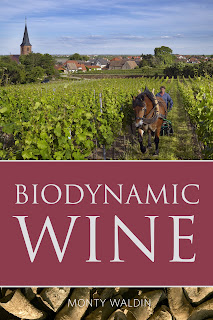Biodynamic wine by Monty Waldin
There is no one better qualified than Monty to
write a book on biodynamic wine. As he
says in his introduction, he has worked first in conventional, then in organic
and finally in biodynamic vineyards and wineries on and off since 1984 and he
is convinced that biodynamics remain ‘the
best tool with which to make terroir driven wines of the highest quality while
enhancing rather than depleting the vineyard it came from’. The very first biodynamic vineyard he visited was in Bordeaux in
the appellation of Canon Fronsac, in 1993.
Month first of all gives an in-depth exposé of the origins of biodynamics, which date from 1924. He covers the work of the pioneering Austrian
Rudolf Steiner, with the philosophical reasoning behind the practice. Biodynamics depend upon key preparations and
these Monty covers in exhaustive detail, providing details for the professional
wine grower who may be considering converting their vineyard to
biodynamics. The scope is far beyond the
requirements of a mere layman and I found myself at times overwhelmed by some
of the minutiae, but then there were some charming details. It is for instance
best to use cow horns from their own locality. From cow horns Monty moves onto the
various compost preparations, discussing stinging nettles and oak bark,
dandelion and so. Dynamizing (or stirring) is a key part of biodynamic
practice and that Monty discusses in great detail. And then he considers other
sprays and techniques before concluding with a chapter on the celestial
rhythms. This is a significant part of
biodynamics as 'it is modern farming's first attempt to take account of the
movements of and forces exerted by the moon and other planets, and by the sun
and other stars, when timing agricultural work'. The
lunar cycles and their effects are covered in detail with many pertinent
observations.
In short this is invaluable
for anyone who wishes to understand the intricacies of biodynamics in any
detail and it is undoubtedly relevant to the continuing
growth of biodynamic viticulture in the Languedoc.

Comments